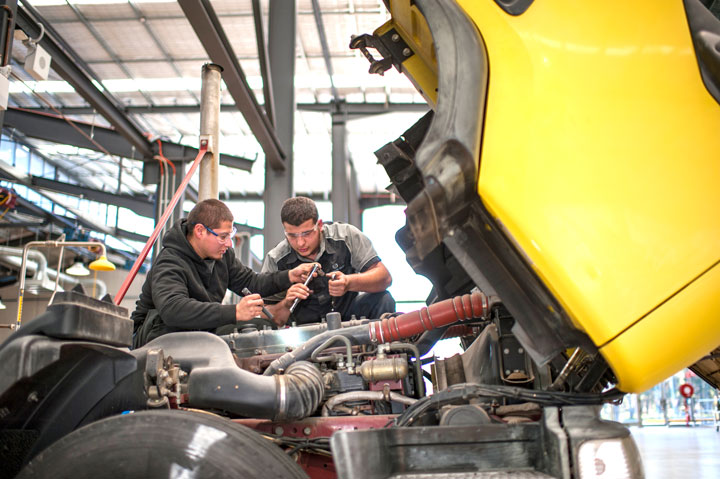Skip to main content
Start quiz
- Go to homepage
- Course areas
- Automotive
- Certificate III in Heavy Commercial Vehicle Mechanical Technology
Back to:Automotive
National code: AUR31120
Certificate III in Heavy Commercial Vehicle Mechanical Technology

Overview
About this course
Become a qualified heavy diesel mechanic and learn how to diagnose, repair and maintain heavy vehicles. Enjoy a rewarding career in a skills-shortage industry and play an important role in keeping trucks on the road.
Outcomes
What you'll gain
Learning outcomes
Through a mixture of theory and practical course work, learn to:
use hand and power tools, and workshop equipment
diagnose and repair heavy vehicle automotive, mechanical, pneumatic, hydraulic and electrical systems
take components and mechanical systems apart and put them back together
work alone and as part of a team
follow safe working practices.
Course outcomes
Learn core skills that prepare you for opportunities in your chosen field.
Experience diagnosing and testing electrical systems.
A trade-level qualification.
Eligibility to apply for your motor vehicle tradesperson certificate.
Skills to place you in high demand in a recognised skills-shortage industry.
Suitability
Is this course right for you?
Entry requirements
This course requires evidence of previous experience or study before you can enrol.
Apprenticeship
Be employed as an apprentice in the industry.
Register with an Apprenticeship Connect Australia Provider (ACAP) who will support your application.
Non-apprenticeship
This course may be offered as a non-apprenticeship. Check your preferred campus page for more information.
Non-apprenticeship pathways for trade-related qualifications allow you to have your industry skills assessed through recognition of prior learning (RPL) and undertake gap training to gain a trade qualification.
To take this course as a non-apprenticeship, you must: be at least 21 years old as shown by photo identification, have at least 2 years of work experience in this occupation or trade as shown by employee records such as your resume or letters from your employers and be currently employed in the relevant industry as shown by a letter from your employer.
Completion requirements
During your study you'll need to provide your teacher with the following evidence:
Entry recommendations
To be prepared for this course, we recommend that you have:
an interest in mechanics
maths and English skills at a Year 10 level
good communication skills
the ability to work in a team environment
a reasonable level of fitness to manage the physical demands of the role.
The following foundation skills:
You can follow a routine and ask for help if you need it.
You can read everyday texts and find important information.
You can write short sentences or lists to share information.
You can speak clearly and explain your thoughts in a group.
You can solve maths problems you often see in real life.
You can turn on a digital device and follow simple steps.
We tailor our courses to meet local community needs, so some campuses may have extra entry requirements. Check your preferred location for details. Need help preparing? Contact us for support.
Find Your Fit
This simple tool guides you to a suitable course level based on your foundation skills and confidence.
Pathways
Future career and study options
Career pathways
Our graduates go onto roles like:
Motor Mechanic (General)
Motor Mechanics (General) maintain, test and repair petrol engines and the mechanical parts of lightweight motor vehicles such as transmissions, suspension, steering and brakes.
Full-time share Full-time workers usually work 35 hours or more a week (in all their jobs combined).
94%
Employment size Employment size is the number of workers who do this as their main job.
27,000 workers
Average age This is the average age of all workers in this job.
38 years
Weekly pay Median earnings are shown for full-time, non-managerial employees paid at the adult rate, before tax or any amounts that are salary sacrificed. These figures are a guide to earnings only and should not be used to determine a wage rate.
$1,020
Average full-time The average full-time hours that people in this role work each week.
44 hours
Skill level rating Skill level ratings are based on the range and complexity of job roles. In general, the higher the skill level, the more formal education and training, previous experience or on-the-job training needed to be good at the job.
Medium
Gender share
1% female
Future growth The Department of Employment, Skills, Small and Family Business estimates the likely change in number of workers in this role, or industry, over the next 5 years. Future growth is the likely percentage change compared to all other job roles.
Stable
Other jobs include: heavy diesel mechanic and heavy diesel technician.
Licensing
You will need a motor vehicle tradesperson certificate to work in this industry. Anyone who operates in the automotive refrigerant sector must hold relevant the Australian Refrigerant Council Refrigerant Handling licence. It’s important to check the licensing, legislative, regulatory and certification requirements relating to your future career by visiting NSW Fair Trading or your state licensing body.
Study pathways
Take your study further with other courses offered at TAFE NSW:
Previous study0 Courses
Begin here to gain experience and confidence in this study area.
The Certificate III in Heavy Commercial Vehicle Mechanical Technology does not have any pre-requisite courses.
Further study0 Courses
Advance your skills to take your career to the next level
The Certificate III in Heavy Commercial Vehicle Mechanical Technology does not have any post-graduate courses.
Related study0 Courses
Learn core skills that prepare you for opportunities in your chosen field.
The Certificate III in Heavy Commercial Vehicle Mechanical Technology does not have any related courses.
Your experience counts
At TAFE NSW, we recognise your previous study and work experience. You can apply for recognition of prior learning or a credit transfer with any of our courses. If you're successful you'll get your qualification faster.
Units
Units taught in this course
Courses are made up of a combination of both core and specialty units. In the Certificate III in Heavy Commercial Vehicle Mechanical Technology qualification, you’ll need to successfully complete 36 units of competency, including 22 core and 14 speciality units.
Please note, not all specialty units are offered at every TAFE NSW location. It is highly recommended that you check with your preferred campus for information about the specialty units offered at that location.
Core units - 22
Core units are central to the job outcomes of a particular industry or occupation. These are the units industry has agreed are essential to be capable and qualified at a particular study level.
Diagnose and repair heavy vehicle compression ignition enginesAURHTE102
Diagnose and repair heavy vehicle drive shaftsAURHTQ103
Diagnose and repair heavy vehicle emission control systemsAURHTZ101
Diagnose and repair heavy vehicle air braking systemsAURHTB101
- ... 6
TAFE NSW services
Facilities and support
TAFE NSW provides support services across all campus locations and online. Whatever your needs or circumstances, we have the people, resources, counselling and facilities to support you in focusing on your studies.
TAFE NSW Disability Support Service
TAFE NSW Language, Literacy and Numeracy (LLN) support
TAFE NSW Aboriginal Support; Learner support (ABE)
TAFE NSW Careers, Counselling and Pathways Service
TAFE NSW Libraries
Scholarship programs - be supported as you explore your talents and fulfil your potential
Read&Write literacy and study support software is available free for all TAFE NSW students to use while studying on campus and at home
LinkedIn Learning - an online resource which offers innovative courses and tutorials to improve your personal and professional skills
Student associations - get social with our student community
Study options